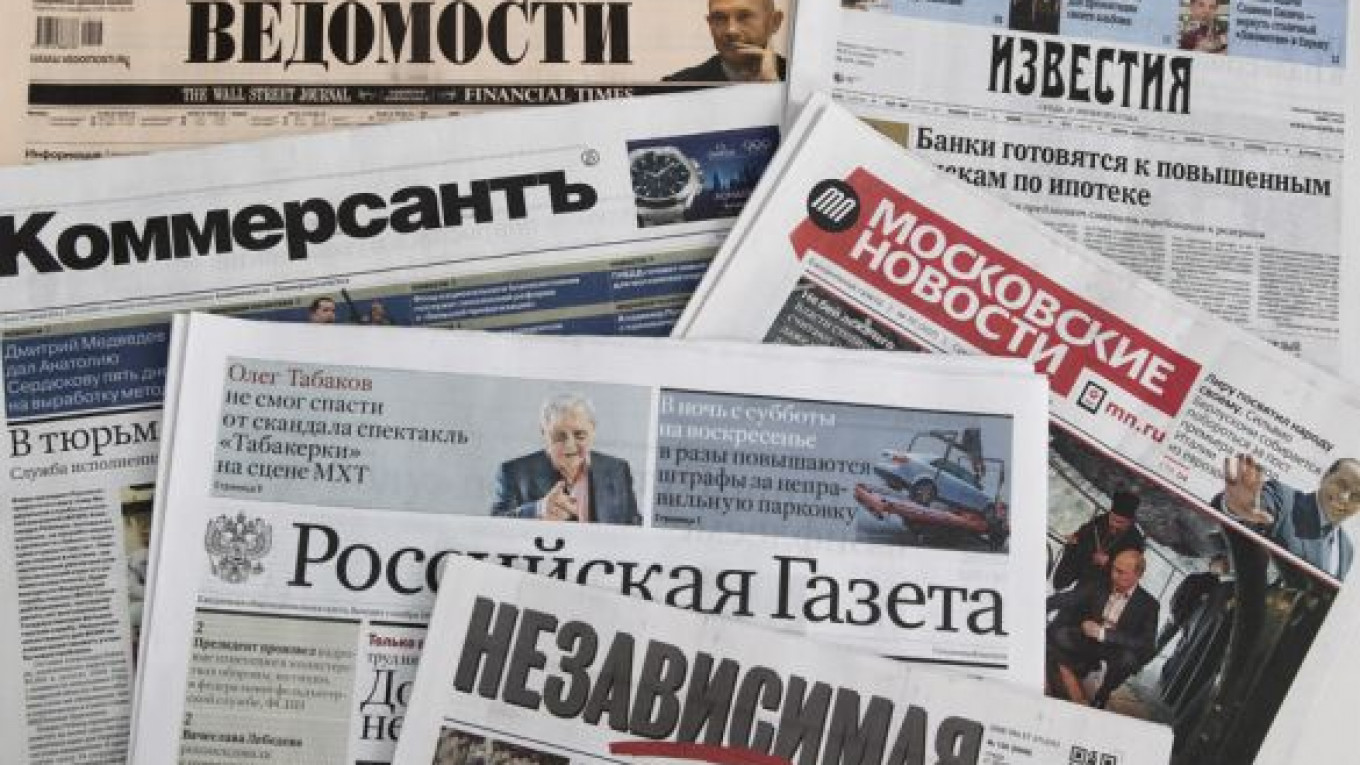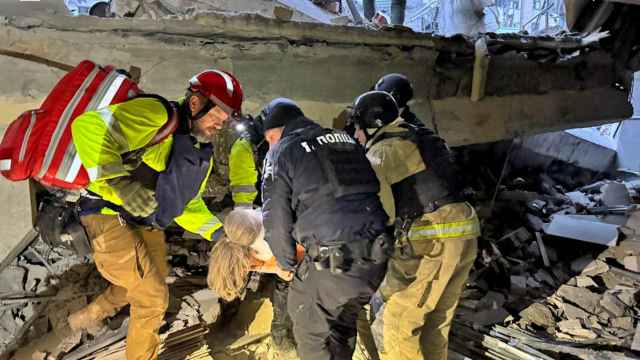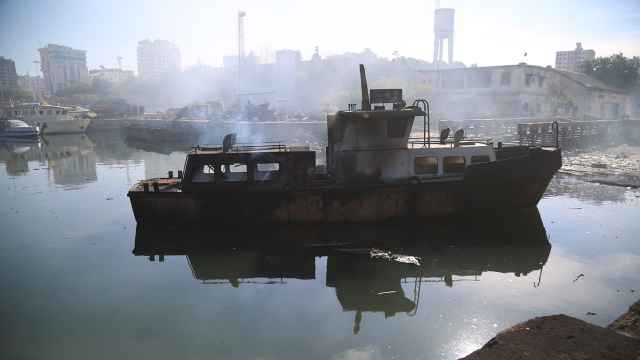Kommersant
1. Dmitry Butrin and Tatyana Yedovina article headlined "Talking from height of technology" says that the U.S. has confirmed its ban on the export of dual purpose goods to Russia and looks at how the sanction will affect Russia's defense industry; pp 1, 6 (634 words).
2. Yelizaveta Kuznetsova article headlined "Wings attached to Crimea" says that in the near future the Russian authorities are to choose the main airline for the Crimean airport in Simferopol; pp 1, 12 (581 words).
3. Galina Dudina et al. report headlined "Schengen visas remain in Ukraine" says the EU has refused to issue visas to Crimean residents. Sources in the Russian government do not think the decision is irreversible; pp 1, 7 (792 words).
4. Andrei Kolesnikov article headlined "Vladimir Putin finds way out of all proposals" gives an ironic account of President Vladimir Putin's meeting with the Federation Council to discuss the integration of Crimea and challenges to be faced; pp 1-2 (1,562 words).
5. Viktor Khamrayev article headlined "Sergei Mironov hurries with early election" says A Just Russia party leader Sergei Mironov stated yesterday that he did not rule out the possibility of an early parliamentary election due to the joining of Crimea and Sevastopol. Experts say another way will be found to ensure the new provinces are represented in parliament; p 2 (456 words).
6. Maxim Ivanov article headlined "Sergei Aksenov opens Magadan for Crimean corrupt officials" says that business ombudsman Boris Titov and the leadership of the Delovaya Rossia organization have promised the Crimean authorities that the peninsula is to become "the Russian Singapore"; p 2 (575 words).
7. Natalya Korchenkova article headlined "Russian channels leave Ukraine for Internet" says that after Kiev authorities suspended the broadcasting of four Russian channels in Ukraine, Gazprom-owned NTV urged viewers to watch programs online; p 2 (506 words).
8. Ivan Safronov article headlined "Moscow to share Triumph with Beijing" says that President Putin has given his consent to sell the up-to-date air defense systems C-400 Triumph to China. Shipping, however, will start in 2016 at the earliest; p 4 (547 words).
9. Tatyana Yedovina and Dmitry Butrin article headlined "Greek diagnosis set for Ukraine" says that the IMF is ready to allocate $27 billion to Ukraine on the condition that profound reforms are implemented in the country; p 6 (616 words).
10. Kirill Belyaninov article headlined "NATO to move to east" says that the U.S. and NATO are going to increase their military presence in Europe in order to prevent the political crisis over Crimea's merger with Russia from escalating; p 7 (450 words).
11. Nina Sokolova article headlined "Bill on dark past tabled in Rada" says that activists of Ukraine's far-right party Svoboda have tabled a bill on "profound purges" in the ranks of left-leaning parties and officials in eastern regions claiming it would "help Ukraine get rid of its enemies"; p 7 (606 words).
12. Maria Yefimova interview with PACE President Anne Brasseur headlined "Ukraine needs decentralization" where she speaks about the Ukrainian crisis and possible solutions; p 7 (571 words).
Nezavisimaya Gazeta
1. Vladimir Skosyrev article headlined "Europe will have to pay more for serenity" says that NATO is going to increase its military presence in eastern Europe in order to show support for the Baltic countries, Poland and Ukraine. U.S. President Barack Obama criticized his allies for curtailing military budgets but said that the West is not starting a Cold War against Russia; pp 1, 8 (581 words).
2.Tatyana Ivzhenko article headlined "Kiev prefers to look at world through its own glasses" says that Kiev has suspended several Russian television channels in Ukraine; pp 1, 7 (1,099 words).
3. Yekaterina Trifonova and Alexandra Samarina article headlined "Patriotic marker for web" says the United Russia party is drafting a bill that would oblige writers and film directors to specify whether their depiction of certain historical events is partly fictional; pp 1, 3 (937 words).
4. Mikhail Sergeiev article headlined "Duties on trade with EU depriving Russians of income" says that experts of the Gaidar Institute say that a free trade zone between the EU and the Customs Union will benefit Russia, Kazakhstan and the EU. Belarus will suffer some losses which can be compensated; pp 1, 4 (842 words).
5. Alexei Gorbachev article headlined "Crimea puts opposition at row" says that left-wing organizations Mossovet and Left Front are going to stage a rally "For Rights of Muscovites". Meanwhile, some left-wing activists want to end cooperation with liberals over their stance on Russia's actions in Crimea; pp 1, 3 (589 words).
6. Anastasia Bashkatova article headlined "Russia may need new anti-crisis measures" quotes Economic Development Minister Alexei Ulyukayev as saying Russia's GDP in 2014 may decrease to 0.6 percent with capital flight reaching $100 billion. The government is forced to devise measures to overcome the growing crisis; pp 1, 4 (1,018 words).
7. Editorial headlined "Maidan has done its part, let it go" looks at the conflict between the new Ukrainian authorities and radicals who took part in the change of authority in Ukraine and says that the new authorities may prove to be more decisive in suppressing armed protests than Viktor Yanukovych; p 2 (492 words).
8. Ivan Rodin and Alexandra Samarina article headlined "Friendliness in response to threats of sanctions" says the Russian government has drafted a bill to bring conditions of incarceration in Russia in accordance with recommendations of the Council of Europe. The move is supposed to signal that despite a tough information war Moscow is not willing to sever relations with Europe; p 3 (958 words).
9. Alina Terekhova article head "Gardens to save people from sanctions" cites polls conducted by the website Superjob and says that the temporary blocking of Visa and MasterCard payment systems has frightened Russians. If the measure is applied to all banks it will cause inconveniences for 66 percent of those polled. However, people are not concerned about the possible disappearance of imported clothes, gadgets and food from store shelves as a result of sanctions; p 4 (693 words).
10. Sergei Turanov article headlined "Russia's best lobbyists in February 2014" presents the ranking of Russia's most successful lobbyists in February; p 5 (1,410 words).
11. Viktoria Panfilova article headlined "Political risks for Kazakhstan" says that Kyrgyzstan's admission to the Customs Union may be postponed due to political instability in the country; p 7 (746 words).
12. Yury Roks article headlined "Moscow and Tbilisi have nothing to discuss in Geneva" argues that the 27th round of talks on security in conflict areas of the South Caucasus has yielded no results; p 7 (590 words).
13.Yevgeny Grigoryev interview with Germany's new Russian affairs coordinator Gernot Erler, headlined "Crimeans' desire to live in Russia without doubt" addresses the Ukrainian crisis and the admission of Crimea into the Russian Federation; p 8 (968 words).
14. Anna Gushina article headlined "Field Marshal al-Sisi changes shoulder straps for tie" says that Egyptian Defense Minister al-Sisi has announced his resignation and presidential bid; p 8 (495 words).
Vedomosti
1. Natalia Biyanova article headlined "Doubling of non-payments" says that the amount of problematic retail credits has almost doubled over the year and reached 620 billion rubles; pp 1, 15 (500 words).
2. Margarita Lyutova and Maxim Tovkaylo article headlined "Zero for $100 billion " quotes Economic Development Minister Alexei Ulyukayev as saying that capital flight might stop Russia's economic growth altogether; pp 1, 4 (650 words).
3. Editorial headlined "Government knows better" says that Russians have begun to trust state mass media outlets more and looks at the reasons; pp 1, 6 (400 words).
4. Lilia Biryukova et al. article headlined "Klishas versus agents" says President Vladimir Putin supported Senator Andrei Klishas's idea to oblige Russians to reveal their dual citizenship and tighten the law for foreign-funded NGOs or "foreign agents".
5. Polina Khimshiashvili article headlined "Ukraine will choose Europe for sure" compares the chances of candidates in the upcoming presidential elections in Ukraine; p 3 (550 words).
6. Alexei Nikolsky and Polina Khimshiashvili article headlined "Dual-purpose technology used on Russia" says large Russian companies are unlikely to be affected by the U.S. ban on the export of dual purpose goods to Russia; p 3 (550 words).
7. Maxim Tovkaylo article headlined "Medvedev assigns Crimea to Russia" details the orders given to Russian ministries by Prime Minister Dmitry Medvedev to devise regulative measures to integrate Crimea into Russia; p 4 (450 words).
8. Darya Borisyak article headlined "State banks to save on dividends" says the Russian government is ready to support state banks that have been hit by U.S.-imposed sanctions; p 10 (400 words).
Rossiiskaya Gazeta
1. Valery Vyzhutovich article headlined "Visa challenge" comments on Ukraine's idea of introducing visas for Russians; p 3 (900 words).
2. Natalya Yachmennikova interview with Tupolev company CEO Nikolai Savitskikh headlined "Class of Tupolev" talks about a new aircraft model designed by the company, and the company's prospects; p 4 (800 words).
3. Anna Roze article headlined "Helmut Schmidt supports Moscow with word" says German politician Helmut Schmidt has described European and U.S. sanctions against Russia as nonsense and recommended that German chancellor conduct talks with Russia; p 8 (700 words).
5. Ivan Yegorov article headlined "Bad ideas" says that the U.S. has suspended cooperation with Russia in countering drug trafficking; p 8 (350 words).
6. Yevgeny Shestakov article headlined "Gifts of Svoboda" says that Ukraine's far-right party Svoboda has put forward lustration legislation to target former top officials, foreign intelligence agents, corrupt officials and their children; p 9 (700 words).
7. Yury Gavrilov article headlined "Ships change flags" speculates on the future of Ukrainian navy equipment left in Crimea; p 9 (450 words)
8. Alexander Lenin article headlined "Maidan attacking Rada again" says that several dozens of activists opposing the government's plans to raise taxes have attempted to storm the Ukrainian parliament; p 9 (400 words).
9. Article by Deputy Prime Minister Dmitry Rogozin headlined "Jumping to sixth generation" discusses who will ensure Russia's breakthrough in science and technology; p 17 (2,500 words).
Izvestia
1. Natalya Bashlykova article headlined "Interests of Russian business in Ukraine will be protected by commission" says that a group to protect the interests of Russian businesses in Ukraine will be set up in the State Duma; pp 1, 3 (620 words).
2. Natalya Bashlykova article headlined "Russia does not fear exclusion from PACE" says that the Russian delegation intends to take part in PACE's April session despite a number of tough statements by European lawmakers; p 2 (771 words).
3. Tatyana Baykova article headlined "Boris Berezovsky's relatives do not believe in suicide" says that the deceased oligarch's relatives are determined to continue the probe into his death; p 10 (774 words).
4. Rafael Fakhrutdinov article headlined "Pilot convicted in U.S. complains of health problems" says that pilot Konstantin Yaroshenko, sentenced to 20 years in prison for drug trafficking, has written a letter to Foreign Minister Sergei Lavrov; p 10 (455 words).
5. Konstantin Volkov article headlined "DPRK conducting talks along with missile launches" says that more frequent launches of North Korean ballistic missiles have raised serious concerns in the UN; p 10 (551 words).
6. Darya Tsoy article headlined "Czech Republic does not support economic sanctions against Russia" says that the Czech parliament has refused to view Crimea's admission to Russia as annexation and does not support the introduction of economic sanctions against Russia; p 10 (466 words).
Moskovsky Komsomolets
1. Mikhail Rostovsky op-ed headlined "Ukraine's weakness as main threat for Russia" looks at the dangers Ukraine may present for Russia; pp 1, 3 (821 words).
2. Mikhail Rostovsky article headlined "How can Russia avoid Maidan?" analyzes measures the authorities can take to appease unhappy citizens; pp 1, 5 (1,200 words).
3. Natalya Rozhkova article headlined "Early parliamentary election possible: 'Putin not content with its current make-up'" features experts' comments on the possibility of early parliamentary election in 2015; p 2 (517 words).
4. Yekaterina Petukhova and Natalya Rozhkova article headlined "Lustration in Ukrainian way to affect 6-year-old children but not oligarchs" comments on the lustration bill to affect 145 former top officials, law enforcers and their families tabled by the far-right party Svoboda; p 3 (840 words).
Novaya Gazeta
1. Andrei Lipsky report "Looking for peace path" says that the first signs of a sensible dialogue on Ukraine have appeared. Russia is beginning to backtrack on its tenacious unwillingness to communicate with the 'illegitimate' Ukrainian authorities, the article says. Foreign Minister Sergei Lavrov met his Ukrainian counterpart in The Hague; p 4 (800 words).
2. Alexander Mineyev report "Russia unites West" looks at Barack Obama's speech addressing students and young people in Brussels. The Kremlin's "Crimean epic" has unexpectedly made the Western world unite, article says; p 5 (650 words).
3. Yulia Latynina report "Raw material weapon" says that Russia has forgotten how to use gas as a commodity. The share of Russian gas after the gas war declared on Ukraine in 2006, is steadily decreasing; p 5 (750 words).
RBK Daily
1. Yelena Malysheva et al. report "Russian Crimea: Blackjack and rumors" says that the Russian authorities are looking at the possibility to set up a gambling zone in the peninsula, Bloomberg has said quoting several sources informed of the government's plans; pp 1, 6 (700 words).
2. Maria Makutina report "Dual criminal citizenship" says that criminal responsibility for concealing dual citizenship may be introduced in Russia; p 2 (600 words).
3. Andrei Kotov report "Ukraine connects to IMF" comments on Ukraine's agreement with the IMF on loans to be provided to the country within the next two years; p 3 (650 words).
4. Ivan Tkachev report "Barrel sight sanctions" says that as from March 1, the U.S. has suspended the export of goods to Russia that fall under the export control regime; p 3 (600 words).
Noviye Izvestia
1. Yekaterina Dyatlovskaya report "Protest venues to get 'security passports'" says that Interior Ministry has prepared a draft government resolution suggesting that protest venues in the country should be classified depending on their "anti-terrorist degree of protection"; p 2 (300 words).
2. Margarita Alekhina report "'We are sliding into worst times of our history"' says that the presidential human rights council has made a statement over the situation with Andrei Zubov, a professor at the Moscow State Institute of International Relations, who was sacked because of his article against Russia sending its troops to Crimea; p 3 (400 words).
Komsomolskaya Pravda
1. Yelena Krivyakina brief report "Putin has twice as high rating as Obama" says that according to a VTsIOM poll, Vladimir Putin's approval rating has reached 82.3 percent; p 2 (150 words).
2. Alexei Kuznetsov report "Is Russian business ready for West's sanctions?" looks at the steps to be taken by the Russian authorities to support the country's biggest companies amid threats of economic sanctions on the part of the U.S. and Europe; p 9 (850 words).
Trud
1. Sergei Frolov report "Moscow-Simferopol. Then everywhere" looks at a process of adaptation of Crimea to "new reality". The state is showing an "effective system of adaptation of new territories", article says; pp 1-2 (1,400 words).
2. Oleg Yuryev report "Drug kingpins applaud Obama" says that on March 27 the U.S. suspended cooperation with Russia on drug control; p 1 (500 words).
Tvoi Den
1. Alexander Popov report "Our land, god damn it" says that the Mayor of Yakutsk has said that the Russian Orthodox Church has claims to an island off the coast of Alaska; p 2 (250 words).
Source: BBC Monitoring / ©BBC
A Message from The Moscow Times:
Dear readers,
We are facing unprecedented challenges. Russia's Prosecutor General's Office has designated The Moscow Times as an "undesirable" organization, criminalizing our work and putting our staff at risk of prosecution. This follows our earlier unjust labeling as a "foreign agent."
These actions are direct attempts to silence independent journalism in Russia. The authorities claim our work "discredits the decisions of the Russian leadership." We see things differently: we strive to provide accurate, unbiased reporting on Russia.
We, the journalists of The Moscow Times, refuse to be silenced. But to continue our work, we need your help.
Your support, no matter how small, makes a world of difference. If you can, please support us monthly starting from just $2. It's quick to set up, and every contribution makes a significant impact.
By supporting The Moscow Times, you're defending open, independent journalism in the face of repression. Thank you for standing with us.
Remind me later.






